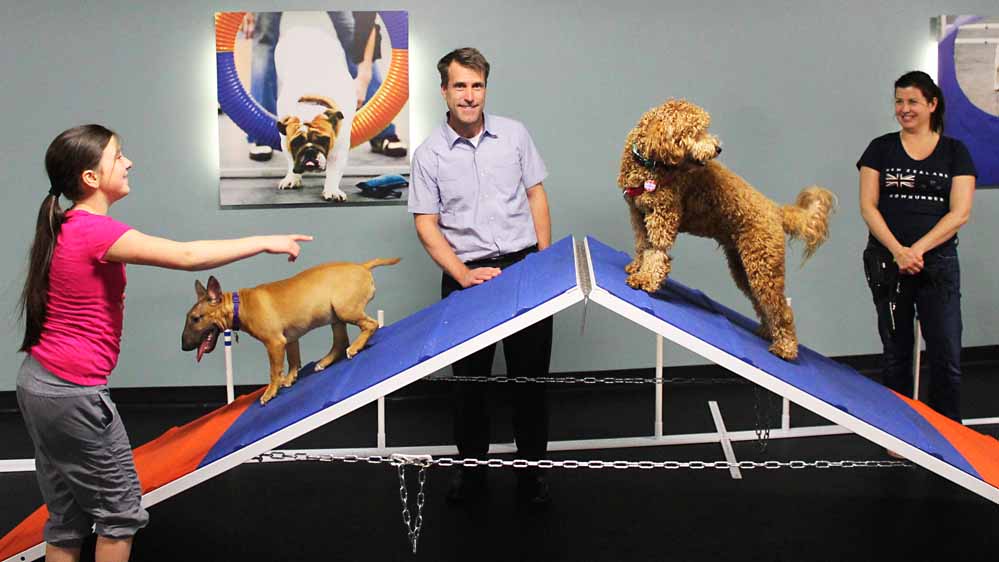Effective Techniques for Successful Pet Training: A Comprehensive Guide
Reliable pet dog training calls for a nuanced understanding of canine behavior. It rests on the principles of favorable support and uniformity. Instructors need to recognize the relevance of crucial commands and socializing. Addressing usual behavioral problems can transform a canine's personality. As the bond between proprietor and canine enhances, the way they communicate progresses. The trip of effective training includes numerous methods that might shock also experienced animal owners. What are the crucial elements that can make a substantial distinction?
Understanding Canine Behavior
Recognizing canine behavior is vital for effective canine training, as it allows trainers to analyze a pet dog's actions and reactions in various scenarios. Dogs interact primarily with body language, vocalizations, and face expressions. Recognizing signs of stress, aggression, or anxiety can assist fitness instructors adjust their strategies to assure a positive training experience. A wagging tail does not always suggest happiness; the context and various other body hints have to be thought about.
In addition, comprehending a pet's breed-specific qualities can offer understandings into their actions patterns and reactions. Socializing plays an important role fit a canine's feedbacks to brand-new people and settings. Observing a pet's play design can additionally disclose their character and comfort degrees. By very carefully assessing these behaviors, instructors can develop customized methods that promote knowing and reinforce the bond in between canine and owner, ultimately bring about even more successful training end results.
The Significance of Favorable Reinforcement
Positive reinforcement is a crucial method in canine training that boosts the discovering process by satisfying desired actions. This approach urges canines to duplicate actions that yield favorable end results, such as treats, praise, or play (Dog Training Near Me). By connecting etiquette with incentives, dogs end up being extra determined and engaged throughout training sessions

Including positive reinforcement into training regimens can result in quicker knowing and much better retention of commands. It advertises a cheerful environment that boosts both the pet's experience and the trainer's fulfillment, making it an essential facet of efficient pet training.
Crucial Commands Every Canine Ought To Know

Developing a Constant Training Schedule
Developing a consistent training schedule is important for reliable canine training, as it helps reinforce learning and develops a sense of routine for the canine. An organized technique enables both the trainer and the dog to anticipate training sessions, which can improve focus and engagement. Ideally, training sessions ought to be short, lasting between 5 to 15 minutes, to preserve the pet dog's interest and interest.
Including training right into day-to-day tasks, such as nourishment or walks, can additionally promote consistency. This integration aids pet dogs associate training with positive experiences. It is essential for fitness instructors to remain flexible; unexpected occasions might necessitate modifications to the routine.
In addition, repeating is crucial. Routine practice of commands and habits solidifies understanding and constructs self-confidence. By sticking to a constant timetable, instructors can assure that their pet dogs create great practices and react accurately to commands, preparing for effective training outcomes.
Socializing: Secret to a Well-Adjusted Pet dog
Socializing is important for a canine's growth, influencing their actions and communications with individuals and other pets. Very early direct exposure to different atmospheres, sounds, and experiences can considerably improve a dog's flexibility and self-confidence. Employing effective socializing techniques can assist ensure a well-adjusted canine companion.
Relevance of Very Early Socialization

Methods for Reliable Socializing
While numerous dog proprietors identify the value of socializing, recognizing efficient techniques to promote this process is essential for cultivating a well-adjusted family pet. Progressive exposure to varied settings, people, and various other pets can greatly resource boost a canine's comfort degree in different scenarios. Positive support plays a crucial duty; satisfying wanted habits encourages pets to come close to new experiences with confidence. Structured playdates with well-mannered canines assist create social skills and alleviate worry reactions. Enlisting in obedience courses can also give regulated atmospheres for socializing. Preserving a calm demeanor as a proprietor strengthens the canine's feeling of security, permitting for more successful interactions. These strategies collectively contribute to a well balanced and adaptable canine buddy.
Taking Care Of Common Behavioral Issues
Managing common behavioral problems is necessary for keeping an unified partnership in between dogs and their owners. Key difficulties such as aggressiveness, excessive barking, and leaping habits require targeted approaches to manage properly. Recognizing the origin of these habits can result in effective treatments and an extra well balanced canine buddy.
Addressing Aggressiveness Issues
Aggressiveness in canines can materialize in numerous forms, presenting challenges for instructors and proprietors alike. Attending to these concerns demands an extensive understanding of the underlying reasons, which might include concern, resource, or territoriality guarding. Determining triggers is vital; owners should observe their dog's body movement and actions to pinpoint details situations that provoke aggression. Positive support methods can successfully change hostile behavior, gratifying calm reactions to identified triggers. Uniformity is vital, and owners need to remain person throughout the training procedure. In many cases, professional support from a licensed pet dog instructor or behaviorist might be needed, especially for extreme aggressiveness. Ultimately, the objective is to produce a safe atmosphere for both the canine and those around it.
Taking Care Of Excessive Barking
Extreme barking can be a significant hassle for canine owners and neighbors alike, usually signaling underlying problems that need dealing with. Recognizing the triggers behind the barking is vital; these might consist of monotony, stress and anxiety, or a feedback to external stimuli. Proprietors must observe their pet dog's actions and atmosphere to determine the reason. Dog Training Near Me. Executing constant training methods, such as favorable support, can effectively minimize barking. Showing commands like "silent" or rerouting the dog's focus presently of barking can be beneficial. In addition, providing sufficient physical and psychological excitement with exercises and interactive playthings can relieve boredom-related barking. Sometimes, getting in touch with a specialist trainer or behaviorist might be necessary to create customized techniques that deal with persistent barking concerns
Lowering Leaping Behavior
Many canines display leaping actions, commonly as a way of expressing exhilaration or looking for focus from their visitors and owners. This behavior can be problematic, especially when it brings about unintended injuries or pain for guests. To lower leaping, proprietors ought to first continue to be calm and stay clear of compensating the habits with focus, as this can enhance it. Rather, they can instruct an alternative habits, such as resting, by awarding the dog for remaining tranquility when somebody strategies. Consistency is key; all family members have to apply the very same policies. Furthermore, training sessions should consist of disturbances to aid the pet dog discover to control their impulses. With time, with patience and persistence, leaping can be greatly minimized, causing a much more pleasurable atmosphere.
Building a Solid Bond Through Educating
Although training a dog commonly concentrates on habits and commands, it additionally offers as an important chance to reinforce the bond between the dog and its proprietor. Engaging in training sessions promotes interaction, common understanding, and depend on. When proprietors invest time in showing their dogs, they show dedication, which aids the pet dog really feel protected and valued. Favorable reinforcement methods, such as treats and praise, not just encourage preferred behaviors but also enhance the emotional link in between the pet and proprietor.
Furthermore, uniformity in training develops a feeling of dependability, allowing pets to comprehend their duty within the house. Each effective command increases the canine's confidence, causing a deeper partnership. Regular training sessions can try this website come to be delightful bonding experiences, full of playfulness and communication - Dog Training Near Me. Eventually, the procedure of training goes beyond mere obedience, creating a collaboration that enhances the lives of both the pet and its owner
Regularly Asked Inquiries
What Age Is Finest to Begin Training a Pup?
The very best age to start training a young puppy is generally between 8 to 12 weeks. At this stage, puppies are most receptive to discovering, making it an excellent time for fundamental training and socialization.
How much time Should Each Educating Session Last?
The suitable duration for each pet dog training session normally ranges from 5 to 15 mins, depending on the dog's age and attention period. Short, concentrated sessions boost learning and retention, making training a lot more pleasurable and effective.
Can Older Canines Still Be Trained Efficiently?
Older canines can undoubtedly be educated effectively. With patience and regular techniques, they can discover brand-new commands check this site out and behaviors. Their experience frequently makes them extra receptive to training, boosting the bond in between pet and owner.
What Equipment Do I Need for Training?
For effective dog training, necessary equipment consists of a strong leash, a comfortable harness, high-value treats, training clickers, and a selection of toys. These tools facilitate interaction and enhance positive habits during training sessions.
Just how Do I Track My Pet dog's Training Development?
To track a dog's training progress, one can preserve a journal, document milestones, and note behavioral changes. Normal assessments, including timed commands and obedience tests, aid assess renovation and recognize areas requiring further attention.
Understanding canine actions is necessary for effective pet training, as it permits instructors to translate a canine's actions and reactions in various circumstances. Developing a constant training timetable is vital for efficient pet training, as it assists strengthen learning and develops a feeling of routine for the pet. Training a dog usually concentrates on behaviors and commands, it also offers as a vital possibility to enhance the bond between the pet dog and its owner. When owners spend time in educating their canines, they demonstrate dedication, which assists the pet dog really feel safe and secure and valued. The perfect period for each dog training session usually ranges from 5 to 15 mins, depending on the pet's age and attention period.